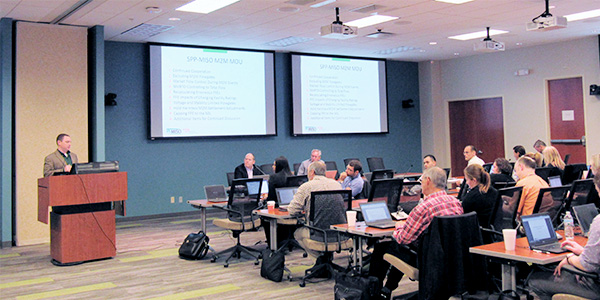By Amanda Durish Cook
MISO and SPP plan to file a slightly revised version of proposed changes to their joint operating agreement aimed at making a first interregional project between the two more attainable.
Targeted for the first quarter of 2019, the RTOs’ filing will still eliminate the $5 million cost threshold for the projects, add avoided costs and adjusted production cost benefits to project evaluation, mandate coordinated system plan studies, and remove the joint modeling requirement in favor of individual RTO regional analyses. (See MISO, SPP to Ease Interregional Project Criteria.)
But with recent changes, the proposal will now require that a coordinated system plan (CSP) — the joint study used to identify interregional transmission needs — take place once every two years instead of the originally proposed three years.
MISO and SPP also restored the JOA’s original opt-in instead of an opt-out approach for the CSP study agreement. The RTOs had proposed that the two would have to agree not to perform a study in order to skip a CSP, but now they will actually have to agree to initiate a CSP before undertaking one.
“I think SPP and MISO’s intent is still to do a study annually,” SPP’s Adam Bell said during a Dec. 20 conference call held by the RTOs’ Interregional Planning Stakeholder Advisory Committee (IPSAC).
But multiple stakeholders pointed out that the CSP study process is historically an 18-month process and doesn’t fit well into the annual time frame. However, RTO staff said the studies, now evaluated regionally, will probably take less time to complete.
Entergy’s Jennifer Amerkhail said her company opposed the study frequency minimum. She reminded the RTOs of their “fiduciary responsibility” to not expend resources on CSP studies that aren’t ultimately necessary.
JPC Review
The RTOs have also added to the proposal both a study model review and project review by the Joint Planning Committee (JPC), an interregional group comprising representatives from both RTOs. The JPC will also vote on a project’s proposed interregional cost allocation.
Some stakeholders questioned the need for a JPC review and vote, saying the RTOs may be introducing another interregional project hurdle.
Bell said the JPC review isn’t for “leverage” purposes but to ensure that projects “have more certainty” before they are decided on by the RTOs’ boards of directors. He said it’s best for the JPC to meet and ensure all project expectations can be realized.
“It’s so we’re not operating blindly,” Bell said. “It’s not to second-guess assumptions or cost allocations.”
Stakeholders questioned what the impact of a JPC vote would be, asking whether the vote was a recommendation or binding vote, which could lead to re-evaluation of projects and delay before projects are put to either board.
Officials said the RTOs’ already-approved regional processes will be used by the JPC to evaluate the projects.
“There would be no reason for the JPC to deviate from the regional process and the study findings,” Bell said.
LS Power’s Pat Hayes asked for the RTOs to develop criteria to guide the JPC in its votes on projects.
But RTO officials reiterated that their regional processes will guide JPC decisions, with some noting the committee already reviews project candidates under the current interregional process.
Negative APC Consideration
SPP and MISO also agreed to evaluate adjusted production costs and avoided costs for all potential interregional projects regardless of whether the projects are driven by economics, reliability or public policy.
The two also said they have “tentatively” agreed to include negative adjusted production cost values to evaluate reliability and public policy projects.
However, Bell said the RTOs will craft language that would still allow for otherwise beneficial projects that happen to have negative adjusted production costs. Bell said MISO and SPP legal teams are still deciding whether to include the caveat in the JOA.
Adam McKinnie, chief economist with the Missouri Public Service Commission, asked if projects with negative values must be pursued through special FERC filings to find a different cost allocation methodology. Bell said that would probably be the case.



